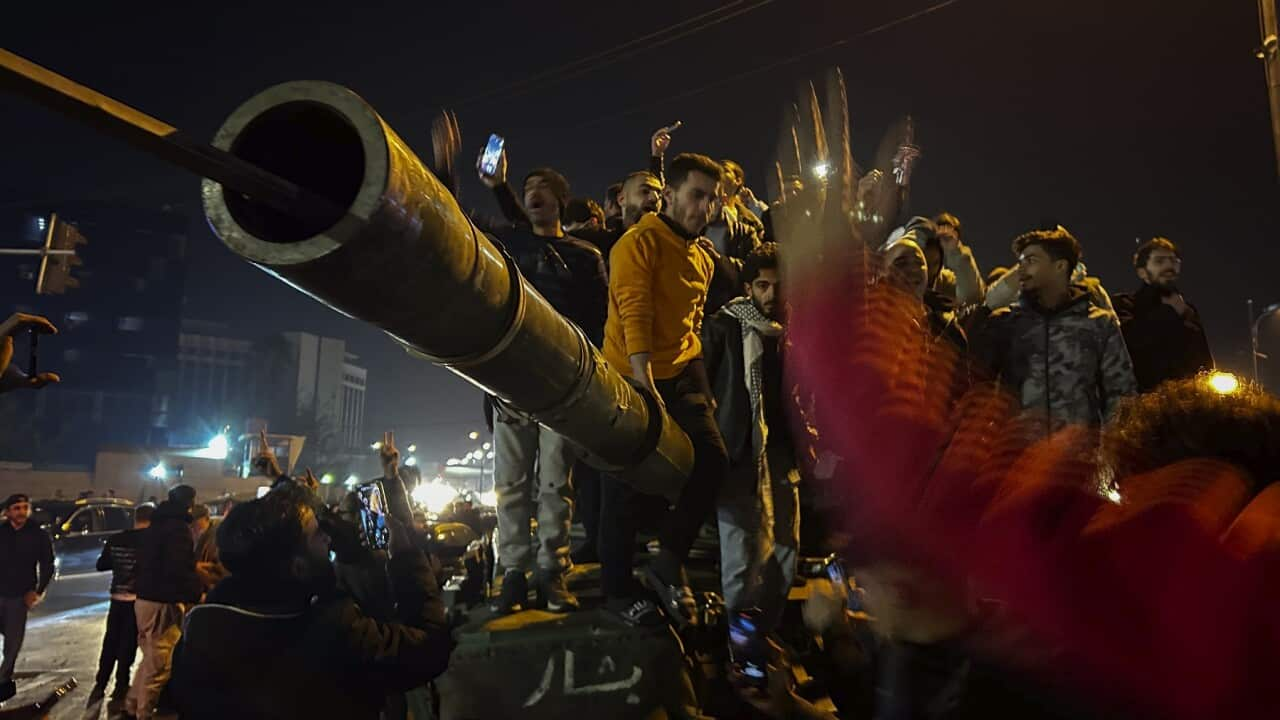TRANSCRIPT:
These are the sounds of celebrations in the Syrian capital of Damascus.
Witnesses report thousands of people in cars and on foot, congregating at a main square in the city, waving and chanting "freedom".
The reason for their joy is the reputed end of the authoritarian regime of President Bashar al-Assad after 24 years.
He is said to have fled Damascus in an airplane for an unknown location as rebel forces moved into the city, freeing thousands of detainees from the city prison and prompting security forces to leave in haste after burning their documents.
The end of Assad's decades-long grip on power has been confirmed by both Syria's army command - and rebel officers in a brief statement on state television.
"Statement Number 1, Fatah Damascus Operations Room, In the name of God, the Most Gracious, the Most Merciful By the grace of God Almighty, the city of Damascus has been liberated, the tyrant Bashar al-Assad has been toppled, and all the unjustly detained persons from the regime’s prisons have been released. The Fatah Damascus Operations Room calls upon the mujahideen brothers and citizens to preserve all the properties of the free Syrian state. Long live a free and independent Syria for all Syrians of all sects."
Mohammed Ghazi Jalali is the Syrian Prime Minister.
He says he won't be following Assad's example, and that the government is ready to “extend its hand” to the opposition and turn its functions over to a transitional government.
"I am here in my house, I have not left it and I do not intend to leave it except in a peaceful manner, so that I can ensure the continuity of the work of public institutions and state institutions and facilities, and ensure there will be security and reassurances to our fellow citizens. I hope that everyone will think rationally and think about their homeland and country."
US President Joe Biden and his team say they're monitoring the extraordinary events in Syria, and are in touch with regional partners.
Meanwhile, the UN Special Envoy for Syria, Geir Pedersen has called for urgent talks in Geneva to ensure an orderly transition of power.
"The need for an ordinary political transition has never been more urgent, starting with the urgent formation of inclusive and credible transitional arrangements in Syria. For this we need an urgent serious process fundamentally different from what has gone on before. This must be the start of a process that leads to the realisation of the legitimate aspirations of the Syrian people and the restoration of the sovereignty, independence and unity and territorial integrity of Syria."
This stunning turn of events marks a seismic moment for the Middle East.
Syria's civil war erupted in 2011 as an uprising against Assad's rule, dragging in big outside powers, and creating space for jihadist militants to plot attacks around the world.
It also sent millions of refugees into neighbouring states.
Qatari Prime Minister Mohammed bin Abdulrahman Al Thani told reporters at the Doha Forum that his country had tried to warn the world.
"In Syria, while we had an opportunity in that time when the war over there has calmed down yet, Assad didn't seize this opportunity to start engaging and restoring his relationship with his people. And we didn't see any serious movement, whether it's on the return of the refugees, or on in reconciling with his own people."
The rebel takeover of Damascus not only ends the Assad's family's iron fisted rule over Syria, but it also deals a massive blow to Russia and Iran, the Syrian government's key allies in the region.
Iran and Russia had been in urgent talks on the crisis with Turkiye on the sidelines of the Doha forum as events unfolded in Syria, with Turkiye's Deputy Foreign Affairs Minister Nuh Yilmaz adamant his country had had no involvement in this latest rebel uprising.
“The lack of hope for the comprehensive resolution and the continued violations of the Astana agreement brought the country to this point and seems to be the driving force behind the ongoing operation. Let me underline that: Turkey is not behind the current military operation, nor did we give our consent to it. We did not want to have further instability in the region, as the Israeli aggression is already sweeping the region."
Hayat Tahrir al-Sham, the strongest rebel group, is the former al Qaeda affiliate in Syria regarded by the US and others as a terrorist organisation.
Many Syrians remain fearful it will impose draconian Islamist rule.
But leader Abu Mohammed al-Golani has described recent rebel offensive as "all mercy and love", and in a video published in the last 48 hours, has sought to quell fears of reprisals.
"My dear brothers, we live in the final moments before liberating the city of Homs, God willing. This is a historical moment which will separate what is true from what is false. We advise our brothers in jihad, as we have advised them before, to be compassionate to the people. Those who give up their weapons shall be secured, and those that flee shall be ignored.”
Al-Golani says he has prohibited rebel fighters from attacking public institutions.
The rebel leader says that for now they will remain under the supervision Mohammed Ghazi Jalali, who he called the "former prime minister".













